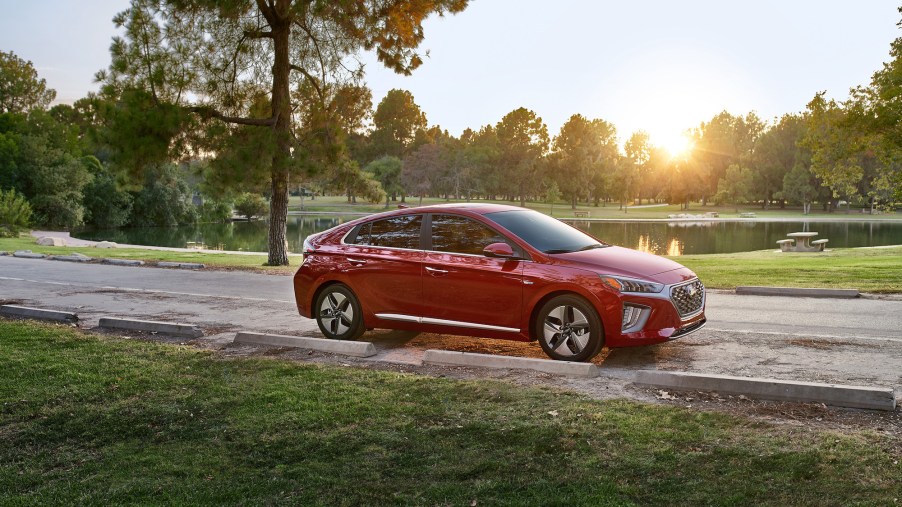
The 2021 Hyundai Ioniq Deservedly Landed at the Top of This List
Small cars aren’t always suited to everyone’s lifestyle, especially if you have a big family. However, sedans are excellent as daily drivers because of their compact dimensions and smaller turning radiuses. Better gas mileage is also a big perk, especially if with a Hyundai Ioniq Hybrid.
According to MotorTrend, the Ioniq Hybrid has the best fuel economy of all other new small cars. Besides its fuel-sipping nature, what else makes the Ioniq Hybrid special?
The 2021 Hyundai Ioniq Hybrid’s efficiency
The Hyundai Ioniq Hybrid gets 59 mpg combined city/highway, with 60 mpg on highway drives. Those numbers are only for the base Ioniq Blue, but the other trims are still quite efficient. All three upper trims are rated for 54/56 mpg city/highway.
In real-world testing, Consumer Reports found that the Hyundai Ioniq SEL’s mileage dropped by 12 mpg during city driving. But it outperformed its EPA estimate on the highway, earning 60 mpg. CR also estimates that drivers will spend only around $555 for every 12,000 miles.
How the competition compares
The 2021 Hyundai Ioniq Hybrid’s EPA estimates threaten to topple the Toyota Prius from its spot as the most recognizable hybrid. The Prius gets only up to 56 mpg combined, and it has a less powerful engine. It offers the advantage of optional all-wheel drive, but many shoppers also find the Prius ugly compared to the Ioniq.
The Hyundai Ioniq also beats its Elantra sibling, which gets only 54 mpg combined. The Mitsubishi Mirage is the most competitively priced on MotorTrend’s list, but it’s difficult to enjoy with its puny engine. The Nissan Versa rests at the bottom of the list, but it’s still rated for a nice 36 mpg combined.
The 2021 Hyundai Ioniq Hybrid’s other highlights
The Hyundai Ioniq Hybrid comes with an electric motor paired with a four-cylinder gas engine, producing 139 hp combined. It needs almost 10 seconds to reach 60 mph, so it’s definitely not the speediest hybrid. MotorTrend says it’s good on handling, but the heavy steering wheel needs frequent adjustments to stay on course.
Like most small cars, the Ioniq Hybrid is also easily unsettled by harsh bumps in the road. And the brakes need plenty of stopping distance, not helped by the mushy pedal feel. CR noted the Ioniq performed decently on its avoidance maneuver test, even if body lean was still noticeable at times.
The interior isn’t exactly upscale, either, but the materials are what you’d expect at the Ioniq’s base price. Hyundai also went the extra mile to use sustainable materials, such as sugarcane composites, to build the interior. Plus, the driver’s seat sits low, but visibility is great, with large windows and narrow roof pillars.
The seats themselves are comfy, too, whether you choose cloth or leather upholstery. Taller riders might not have enough legroom in the backseat, and some critics say the seats aren’t supportive on long trips. The interior is also noisy thanks to the Ioniq’s underpowered engine and excessive winds on the highway.
Smartphone integration, AUX and USB ports, Bluetooth, and an 8.0-inch touchscreen come with the Blue trim. Physical buttons are also located under the screen, though MotorTrend warns that the HVAC controls are confusing. The Hyundai Ioniq Blue also boasts an excellent suite of standard safety features.
With all of its standard features and impressive gas mileage, the Hyundai Ioniq Hybrid is an outstanding value at $23,400. The top-tier Limited, equipped with even more convenience and safety technology, maxes out at $31,400.


